MODALS कक्षा 9 अंग्रेज़ी
What are Modals?
Modal are the helping verbs that are used with main verbs of the sentence to express ability, possibility, certainty, permission and necessity.
Modals ऐसी सहायक क्रियाएँ होती हैं जिनका प्रयोग वाक्य में मुख्य क्रिया के साथ किया जाता है ताकि किए जाने वाले कार्य की समर्थता, सम्भावना, निश्चितता, इजाज़त और आवश्यकता व्यक्त की जा सके।
Can (सकता है) / Could (सका, पाया) / Could have (सकता था)
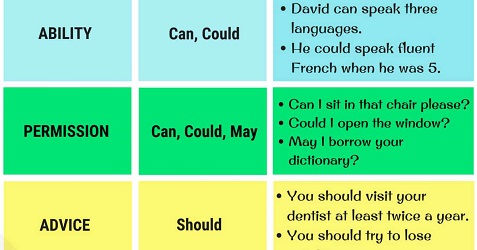
1) Students can come home from school.
1) विद्यार्थी स्कूल से घर आ सकते हैं।
2) People can think wrong about you.
2) लोग तुम्हारे बारे में गलत सोच सकते हैं।
3) Anything could have happened.
3) कुछ भी हो सकता था।
4) You can never love anyone.
4) तुम कभी किसी को प्यार नहीं कर सकते।
May/Might (सकता है) / May have/Might have (सकता था) (Possibility – सम्भावना व्यक्त करने के लिए)
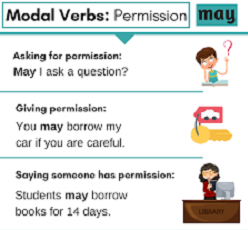
1) It may/might rain today.
1) आज बारिश हो सकती है।
2) It may also happen with you.
2) ये तुम्हारे साथ भी तो हो सकता है।
3) He may have/might have killed anyone.
3) वो किसी को भी मार सकता था।
4) It may/might have rained that day.
4) उस दिन बारिश हो सकती थी।
May (सकता है) (Permission – अनुमति लेने के लिए)
1) May I come in?
1) क्या मैं अन्दर आ सकता हूँ?
2) May I sit?
2) क्या मैं बैठ सकता हूँ?
3) May I have a look at your book once?
3) क्या मैं तुम्हारी किताब एक बार देख सकता हूँ?
May (Wish – इच्छा व्यक्त करने के लिए)
1) May you succeed!
1) भगवान करे आप सफल हो जाएं।
2) May you become a rich man!
2) भगवान आपको बड़ा आदमी बनाए।
3) May God bless you!
3) भगवान आपको आशीर्वाद दे।
4) May you live long!
4) तुम्हें मेरी उम्र लग जाए।
Should (चाहिए) / Should have (चाहिए था)
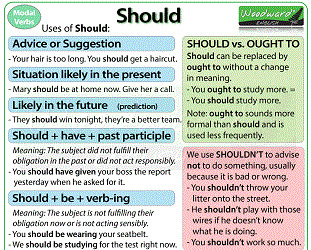
1) You shouldn’t say so.
1) तुम्हें ऐसा नहीं कहना चाहिए।
2) People should leave.
2) लोगों को निकल जाना चाहिए।
3) You should have gone there.
3) तुम्हें वहाँ जाना चाहिए था।
4) You should have at least attended the marriage.
4) तुम्हें कम से कम शादी में तो जाना चाहिए था।
Must (चाहिए ज़रुर) / Must have (चाहिए था ज़रुर)
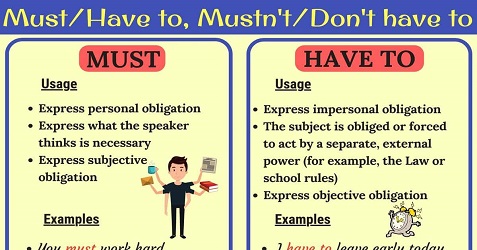
1) Dad is unwell. You must go to see him.
1) पापा बीमार हैं। तुम्हें उन्हें देखने जाना ही चाहिए।
2) We must serve our parents.
2) हमें अपने माता पिता की सेवा करनी चाहिए।
3) You must have come.
3) तुम्हें ज़रुर आना चाहिए था।
IMPORTANT NOTE
If in any sentence of Future Indefinite, Future Continuous or Future Perfect Tense, 'Sure' or 'Sure' is written and you want to translate in Hindi then you don't need to do much, just change 'will' to 'must' And so on if 'maybe' is written, then change 'will' to 'might' or 'may'.
अगर किसी भी Future Indefinite, Future Continuous या Future Perfect Tense के वाक्य में ‘पक्का’ या ‘ज़रुर’ लिखा हो और आपको हिन्दी में अनुवाद करना हो तो ज़्यादा कुछ करने की ज़रुरत नहीं, सिर्फ ‘will’ को ‘must’ में बदल दीजिए और इसी तरह अगर ‘शायद’ लिखा हो, तो ‘will’ को ‘might’ या ‘may’ में बदल दीजिए।
For Example
1) Ram will go.
1) राम जाएगा।
2) Ram must go. (Ram will definitely go.)
2) राम पक्का/ज़रुर जाएगा।
3) Ram may/might go. (Maybe Ram will go.)
3) शायद राम जाएगा। /शायद राम जाए।
Would (बीते हुए कल में कही हुई भविष्य की बात – will की जगह would का प्रयोग) (Something related to future but spoken in past)
1) He said that he would help us.
1) उसने कहा कि वो हमारी मदद करेगा।
2) I knew that he would win.
2) मुझे मालूम था कि वह जीतेगा।
3) I had never thought that he would be this much selfish.
3) मैंने कभी नहीं सोचा था कि वह इतना स्वार्थी होगा।
4) I had no doubt that you would win.
4) मुझे संदेह नहीं था कि तुम जीतोगे।
Would (निवेदन करने के लिए) (For request)
1) Would you please help me?
1) क्या तुम कृपया मेरी मदद करोगे?
2) Would you please open the door?
2) क्या तुम कृपया दरवाजा खोल दोगे?
Used to (किया करता था, करता था)
1) I used to get up early in the morning.
1) मैं सुबह ज़ल्दी उठता था।
2) You used to wake me up.
2) तुम मुझे उठाते थे।
3) We used to play together in childhood.
3) हम बचपन में साथ साथ खेलते थे।
4) He didn’t use to go to school.
4) वो स्कूल नहीं जाता था।
IMPORTANR RULE
RULE:
If 'used to' comes once in a sentence, then 'used to' should not be used again, instead, using 'would' every time is a better option.
अगर वाक्य में एक बार ‘used to’ आ जाये तो ‘used to’ दोबारा प्रयोग नहीं करना चाहिए, उसकी जगह पर हर बार ‘would’ का प्रयोग बेहतर विकल्प है।
For Example:
1) I used to come and he would go.
1) मैं आता था और वो जाता था।
2) I used to get up at 5. Then, I would study for 2 hours.
2) मैं 5 बजे उठ कर दो घंटे पढ़ता था।
Ought to (चाहिए) / Ought to have (चाहिए था)
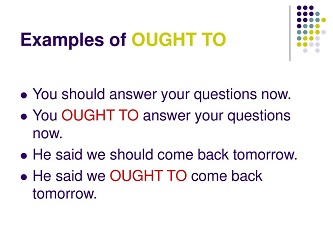
‘Should’ can be replaced with ‘ought to’ but ‘ought to’ is rarely used now.
‘Should’ की जगह ‘ought to’ का प्रयोग भी किया जा सकता है। पर अब ‘ought to’ का प्रयोग अक्सर नहीं होता।
For Example:
1) You ought not to say so.
1) तुम्हें ऐसा नहीं कहना चाहिए।
2) People ought to have left.
2) लोगों को निकल जाना चाहिए था।
Has to/Have to (करना है/करना पड़ता है)
1) We have to go there daily.
1) हमें वहाँ रोज़ जाना पड़ता है।
2) He has to speak politely.
2) उसे प्यार से बात करनी पड़ती है।
3) I have to go.
3) मुझे जाना है।
4) Ram has to come home.
4) राम को घर आना है।
Had to (करना था/करना पड़ता था/करना पड़ा)
1) We had to go there daily.
1) हमें वहाँ रोज़ जाना पड़ता था।
2) I had to go.
2) मुझे जाना था।
3) Had you to do this work?
3) क्या तुम्हें ये काम करना था?
4) Whom had he to meet?
4) उसे किससे मिलना था?
Will have to (करना पडेगा)
1) You will have to face trouble one day.
1) एक दिन तुम्हें परेशानी झेलनी पड़ेगी।
2) I will have to go there one day.
2) मुझे कभी न कभी वहाँ जाना पड़ेगा।
3) Will I have to do this too?
3) क्या मुझे ये भी करना पड़ेगा ?
Dare (हिम्मत करना)
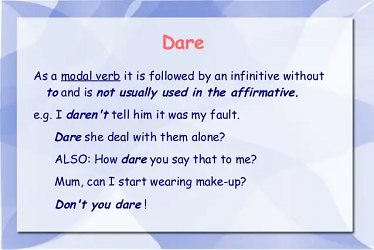
1) He dare not to go there.
1) वो यहाँ जाने की हिम्मत नहीं करता।
2) How dare you come here?
2) तुम्हारी यहाँ आने की हिम्मत कैसे हुई?
3) Ram didn't dare to play.
3) राम ने खेलने की हिम्मत नहीं की।
4) How dare Ram?
4) राम की हिम्मत कैसे हुई ?
When to use Modals
1) Habits:
We can use 'will' and 'would' to talk about habits or things we usually do, or did in the past.
हम आदतों या उन चीजों के बारे में बात करने के लिए 'Will' और 'Would' का उपयोग कर सकते हैं जो हम आमतौर पर करते हैं, या अतीत में करते थे।
Obligation and Advice:
We can use verbs such as 'must' or 'should' to say when something is necessary or unnecessary, or to give advice.
जब कुछ आवश्यक या अनावश्यक हो, या सलाह देने के लिए हम 'Must' या 'Should' जैसे क्रियाओं का उपयोग कर सकते हैं।
Ability:
We use 'can' and 'could' to talk about a skill or ability.
हम किसी कौशल या क्षमता के बारे में बात करने के लिए 'Can' और 'Could' का उपयोग करते हैं।
Practice Exercise
Translate the following sentences.
1. तुम मेरे घर आ सकते थे पर तुम नहीं आए।
2. हमें आज मिलना था।
3. मुझे उससे बात करनी है।
4. उसे किसी भी हालत में वहाँ जाना चाहिए।
5. राहुल को आना पड़ेगा।
6. तुम उसके घर क्यों जाते थे?
7. क्या तुम मुझसे मिलना चाहोगे?
8. शायद वो आज आए।
9. क्या उसे जाना है?
10. अगर मैंने तुम्हें देखा होता, क्या तुमसे बात नहीं करता?
11. मुझे तुम्हारी ज़रुरत नहीं है, बल्कि मुझे तो मेरी माँ चाहिए।
12. उसने कहा था कि वो स्कूल नहीं आएगा।
13. मैं पढ़ने के बजाय खेलना पसन्द करता हूँ।
14. मैं पक्का जाऊँगा वहाँ।
15. मैं जीतना चाहता था पर कभी जीत नहीं पाया।
ANSWER:
1. You could have come my home but you didn't.
2. We had to meet today.
3. I have to talk to him.
4. He must go there at any cost.
5. Rahul will have to come.
6. Why did you use to go his home?
7. Would you like to meet me?
8. He might come today.
9. Has he to go?
10. If I had seen you, wouldn't I have talked to you?
11. I don't need you, rather I need my mom.
12. He had said that he would not come to school.
13. I prefer playing rather than studying.
14. I must go there.
15. I wanted to win but I could never.
Fill in the Blanks
Fill in the blanks with appropriate modals.
1. It is possible that Christopher Marlowe _____________ have written plays for Shakespeare. (might/could)
2. The daughter asked her mother if she _____________ go out. (would/might)
3. Speak slowly lest you ................awake the child. (should/would)
4. Children _____________ take tea at night. (should/must)
5. She came here so that she _____________ (may/might) meet her child.
6. _____________ her soul rest in peace! (Would/ May)
7. They _____________ not read this book for this topic. (need/dare)
8. You _____________ to go to Delhi tomorrow to attend the meeting. (Will have/ should)
9. If you stayed here, you _____________ not face the problem. (would/should)
10. _____________ she had worked hard; she would have passed. (Should/ Must)
ANSWERS:
1. might
2. might
3. should
4. must
5. might
6. May
7. need
8. will have
9. would
10. Should